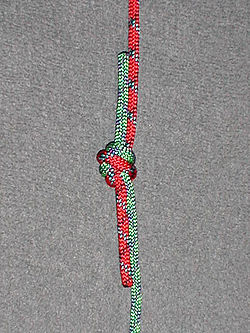Difference between revisions of "AY Honors/Knot/Ring Bend Knot/es"
From Pathfinder Wiki
< AY HonorsAY Honors/Knot/Ring Bend Knot/es
(Created page with "Libro de Respuestas de Especialidades JA/Nudo/Nudo de Agua") |
(Created page with "Los extremos se deben dejar al menos tres pulgadas de largo y el nudo debe ser apretado con el peso del cuerpo. Los extremos pueden ser juntados con cinta adhesiva o ligeramen...") |
||
| Line 5: | Line 5: | ||
| use = The water knot (or tape knot) is a knot frequently used in climbing for joining two ends of webbing together, for instance when making a sling. | | use = The water knot (or tape knot) is a knot frequently used in climbing for joining two ends of webbing together, for instance when making a sling. | ||
| − | + | Los extremos se deben dejar al menos tres pulgadas de largo y el nudo debe ser apretado con el peso del cuerpo. Los extremos pueden ser juntados con cinta adhesiva o ligeramente cosidos para ayudar a evitar que se deslice de nuevo en el nudo. Inspeccione el nudo antes de cada uso. | |
| tying_instructions = | | tying_instructions = | ||
Revision as of 18:31, 26 June 2016
| Ring Bend (Water Knot, Tape Knot) |
|---|
|
Uso: The water knot (or tape knot) is a knot frequently used in climbing for joining two ends of webbing together, for instance when making a sling.
Los extremos se deben dejar al menos tres pulgadas de largo y el nudo debe ser apretado con el peso del cuerpo. Los extremos pueden ser juntados con cinta adhesiva o ligeramente cosidos para ayudar a evitar que se deslice de nuevo en el nudo. Inspeccione el nudo antes de cada uso.
Cómo amarrar:
|

